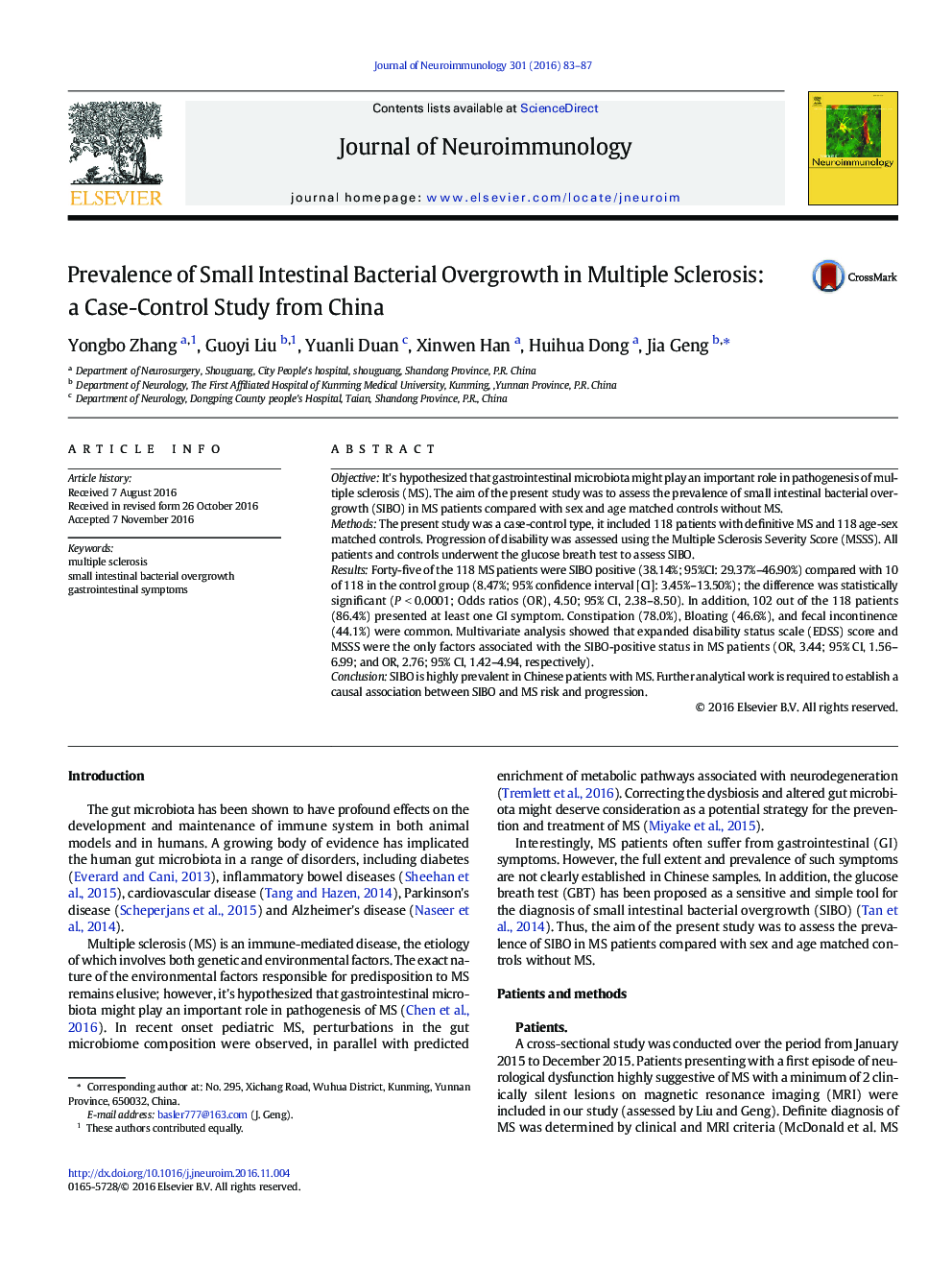| کد مقاله | کد نشریه | سال انتشار | مقاله انگلیسی | نسخه تمام متن |
|---|---|---|---|---|
| 5630240 | 1580374 | 2016 | 5 صفحه PDF | دانلود رایگان |
- Multiple sclerosis (MS) is associated with gastrointestinal motility abnormalities
- Forty-five of the 118 MS patients were SIBO positive (38.14%; 95%CI: 29.37%-46.90%)
- EDSS and MSSS score were associated with the SIBO-positive status in MS patients
- SIBO was associated with worse gastrointestinal symptoms and worse MS severity
ObjectiveIt's hypothesized that gastrointestinal microbiota might play an important role in pathogenesis of multiple sclerosis (MS). The aim of the present study was to assess the prevalence of small intestinal bacterial overgrowth (SIBO) in MS patients compared with sex and age matched controls without MS.MethodsThe present study was a case-control type, it included 118 patients with definitive MS and 118 age-sex matched controls. Progression of disability was assessed using the Multiple Sclerosis Severity Score (MSSS). All patients and controls underwent the glucose breath test to assess SIBO.ResultsForty-five of the 118 MS patients were SIBO positive (38.14%; 95%CI: 29.37%-46.90%) compared with 10 of 118 in the control group (8.47%; 95% confidence interval [CI]: 3.45%-13.50%); the difference was statistically significant (PÂ <Â 0.0001; Odds ratios (OR), 4.50; 95% CI, 2.38-8.50). In addition, 102 out of the 118 patients (86.4%) presented at least one GI symptom. Constipation (78.0%), Bloating (46.6%), and fecal incontinence (44.1%) were common. Multivariate analysis showed that expanded disability status scale (EDSS) score and MSSS were the only factors associated with the SIBO-positive status in MS patients (OR, 3.44; 95% CI, 1.56-6.99; and OR, 2.76; 95% CI, 1.42-4.94, respectively).ConclusionSIBO is highly prevalent in Chinese patients with MS. Further analytical work is required to establish a causal association between SIBO and MS risk and progression.
Graphical AbstractThe aim of the present study was to assess the prevalence of small intestinal bacterial overgrowth (SIBO) in multiple sclerosis (MS) patients compared with sex and age matched controls without MS. The present study was a case-control type, it included 118 patients with definitive MS and 118 age-sex matched controls. All patients and controls underwent the glucose breath test to assess SIBO.Forty-five of the 118 MS patients were SIBO positive (38.14%; 95%CI: 29.37%-46.90%) compared with 10 of 118 in the control group (8.47%; 95%CI: 3.45%-13.50%); the difference was statistically significant (PÂ <Â 0.0001; OR, 4.50; 95% CI, 2.38-8.50). The data shows the mean hydrogen concentrations (ppm) obtained from the breath tests of MS with and without SIBO. Multivariate analysis showed that EDSS and MSSS score were the only factors associated with the SIBO-positive status in MS patients (OR, 3.44; 95% CI, 1.56-6.99; and OR, 2.76; 95% CI, 1.42-4.94, respectively). SIBO is highly prevalent in Chinese patients with MS. Further analytical work is required to establish a causal association between SIBO and MS risk and progression.52
Journal: Journal of Neuroimmunology - Volume 301, 15 December 2016, Pages 83-87
